DUBAI: The United Arab Emirates will impose a minimum top-up tax (DMTT) of 15% on large multinational companies operating in the country starting in January, the finance ministry said on Monday as the government seeks to boost non-oil revenue.
The DMTT is part of the OECD’s global minimum corporate tax agreement which has 136 signatories, including the UAE, to ensure big companies pay a minimum 15% and to make tax avoidance harder.
In amendments to the corporate tax law, the UAE’s finance ministry said the DMTT will apply to companies with consolidated global revenue of 750 million euros ($793.50 million) or more in at least two out of the four financial years preceding the ones in which the tax comes into effect.
The UAE, including Dubai, is a hub for multinationals in the Middle East and the tax amendments come a year after the UAE began rolling out a 9% business tax, with exemptions for the many free zones which power its economy.
The DMTT comes under the Organisation for Economic Co-operation and Development’s (OECD) Two-Pillar Solution, which stipulates that large multinational enterprises pay a minimum effective tax rate of 15% on profits in each country where they operate.
UAE non-oil business activity growth holds steady in November, PMI shows
The UAE’s finance ministry said it is also considering introducing a number of corporate tax incentives, including one for research and development (R&D) that would apply for tax periods starting in 2026.
The expenditure-based incentive would offer a potential 30%-50% refundable tax credit depending on the size of the company’s operations in the UAE and revenue, the ministry added.
A refundable tax credit for high-value employment activities that would be granted to companies as a percentage of eligible income costs for employees is also being considered and could be applied as early as Jan. 1 2025, the ministry said.
Such proposed incentives remain subject to legislative approval.

Source: Brecorder






























